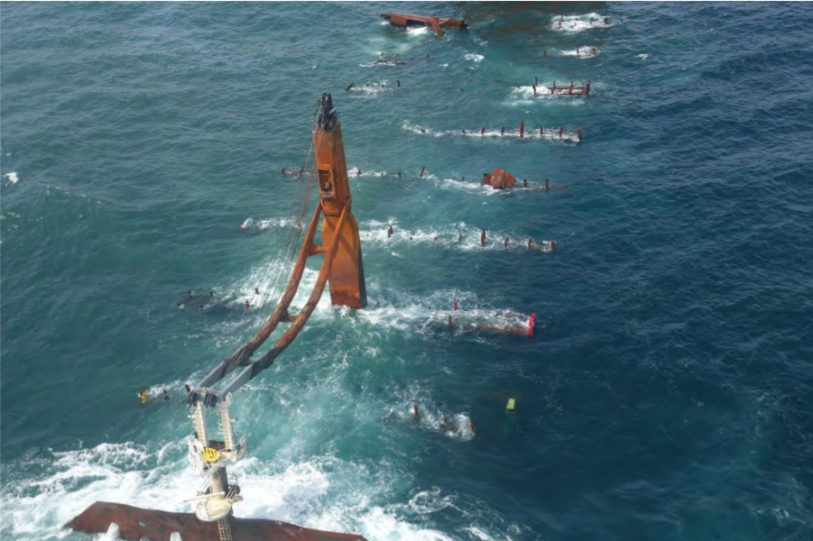Executive Summary
“On 20 May 2021, chemical fume emissions erupted on the Singapore-flagged MV X-Press Pearl container ship as it anchored around 9 nautical miles (17 kilometres) northwest of the Port of Colombo in Sri Lanka national waters. An unknown number of containers, some of which carrying dangerous chemicals and plastic pellets, reportedly fell overboard as an intense fire broke out and explosions occurred on 25 May. Once the fire was under control around a week later, an effort to tow the vessel on 2 June to a deeper water refuge failed and resulted in partial sinking of the vessel.” (UNEP, 2021: 5) By June 17, the entire vessel had sunk and the crew were safely evacuated, thus engendering no casualties.
Key environmental concerns in the aftermath of the incident included: i) a large black smoke plume created by the fire extending inland; ii) potential spill of 15 products classified as Dangerous Goods aboard the ship into the sea, including 25 metric tons of nitric acid; iii) large quantities of plastic pellets, cargo and other debris from the vessel washing ashore along the west coast of Sri Lanka, affecting most notably the Negombo beaches and lagoon – a prime fishing and tourist sector north of Colombo; and iv) a long but limited oil slick continuously leaking form the ship raising concern over a major sudden spill of the 348 tons of bunker fuel aboard the ship.
In response to a request for technical support from the Ministry of Foreign Affairs through the UN Resident Coordinator (RC) in Sri Lanka and the UN Environment Programme, the UNEP/OCHA Joint Environment Unit mobilised a team of four experts. It included two oil/chemical and marine litter experts from the Centre of Documentation, Research and Experimentation on Accidental Water Pollution (CEDRE) in France and a marine environment expert from the Italian National Institute for Environmental Protection and Research (ISPRA). The experts were mobilised through the European Commission’s Directorate General for European Civil Protection and Humanitarian Aid Operations/Emergency Response Coordination Centre (DG ECHO/ERCC). Lead by an environmental assessment specialist from the UNEP Resilience to Disasters and Conflicts Global Support Branch, the mission lasted from 16 to 30 June.
The main objective of the mission was to support the government in designing and implementing an environmental assessment over the short and longer terms. Advise on the measures to be taken to prevent, respond and mitigate risks from the incident including from bunker fuel oil spill containment and clean-up, shoreline clean-up of plastic pellets and other debris, and salvage of the ship wreck and lost containers. Provide longer-term recommendations on strengthening national preparedness and incident management capacity to deal with future maritime disasters. Identify additional expertise needed to address the impacts of the incident and link national counterparts with relevant networks and partners including accredited international laboratories. And, brief the government and international partners on the evolving situation and needs for immediate emergency response and longer-term recovery.
The mission concluded that the limited but continuous release of oil from the wreck represents an evolving threat to the marine environment and necessary control measures should be put in place for a ‘worst case scenario’ of a sudden release of a large volume of bunker oil. A plan should be developed and implemented to setup a monitoring system to detect the release of chemical pollutants from the wreck and lost containers. The wrecked MV X-Press Pearl and the lost containers at sea pose the most immediate risks of this gradually unfolding incident. A plan to eliminate these risks by the removal of the wreck and containers, and their eventual decommissioning is needed. Plastic pollution being a major impact arising from the incident, there’s a need to put in place clean-up actions. Emphasize should be placed on conducting further environmental assessments and monitoring, including of marine pollution, fisheries, marine wildlife, and air pollution, to ensure a safe recovery. Finally, in view of the series environmental emergencies that have recently struck Sri Lanka, there is a need and opportunity to strengthen maritime disaster management capacity. Therefore, the country with assistance from international partners should endeavor to develop a maritime disaster plan and undertake a capacity building programme to help mitigate similar incidents in the future.
